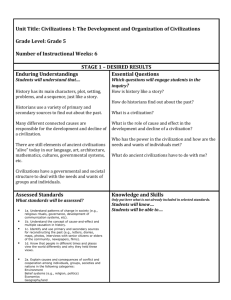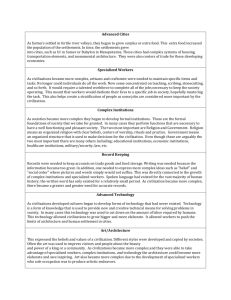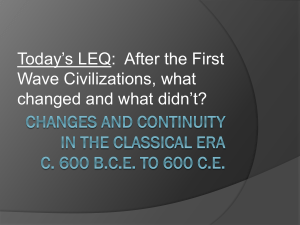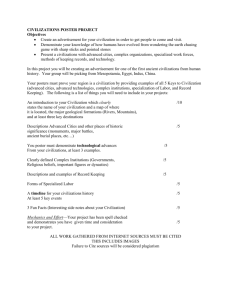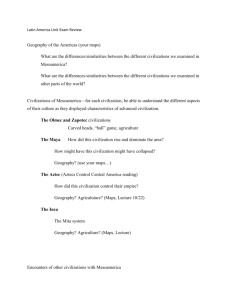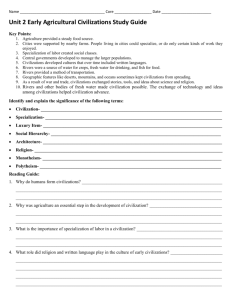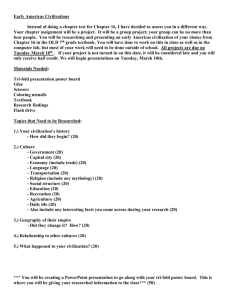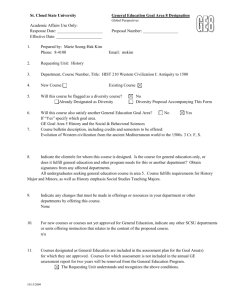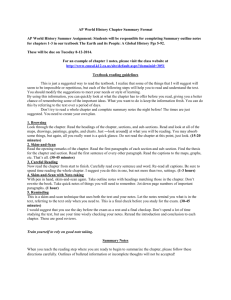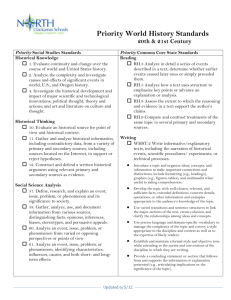Subject and Grade
advertisement
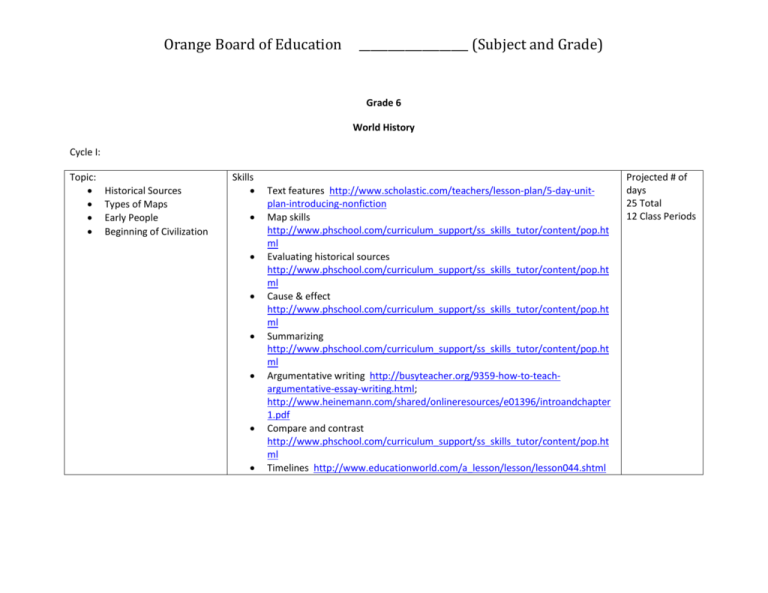
Orange Board of Education ___________________ (Subject and Grade) Grade 6 World History Cycle I: Topic: Historical Sources Types of Maps Early People Beginning of Civilization Skills Text features http://www.scholastic.com/teachers/lesson-plan/5-day-unitplan-introducing-nonfiction Map skills http://www.phschool.com/curriculum_support/ss_skills_tutor/content/pop.ht ml Evaluating historical sources http://www.phschool.com/curriculum_support/ss_skills_tutor/content/pop.ht ml Cause & effect http://www.phschool.com/curriculum_support/ss_skills_tutor/content/pop.ht ml Summarizing http://www.phschool.com/curriculum_support/ss_skills_tutor/content/pop.ht ml Argumentative writing http://busyteacher.org/9359-how-to-teachargumentative-essay-writing.html; http://www.heinemann.com/shared/onlineresources/e01396/introandchapter 1.pdf Compare and contrast http://www.phschool.com/curriculum_support/ss_skills_tutor/content/pop.ht ml Timelines http://www.educationworld.com/a_lesson/lesson/lesson044.shtml Projected # of days 25 Total 12 Class Periods Orange Board of Education ___________________ (Subject and Grade) Early People Goal(s) NJCCCS: Social Studies: 6.2.8.B.1.a: Explain the various migratory patterns of hunters/gatherers who moved from Africa to Eurasia, Australia, and the Americas, and describe the impact of migration on their lives and on the shaping of societies. 6.2.8.C.1.b: Determine the impact of technological advancements on hunter/gatherer and agrarian societies. 6.2.8.D.1.a: Demonstrate an understanding of pre-agricultural and post-agricultural periods in terms of relative length of time. 6.2.8.D.1.c: Explain how archaeological discoveries are used to develop and enhance understanding of life prior to written records. Technology: 8.1.8.A.3: Create a multimedia presentation including sound and images. 8.1.8.A.5: Select and use appropriate tools and digital resources to accomplish a variety of tasks and to solve problems. 8.1.8.B.1: Synthesize and publish information about a local or global issue or event on a collaborative, web-based service (also known as a shared hosted service). CCSS: RH.6-8.7: Integrate visual information (e.g., in charts, graphs, photographs, videos, or maps) with other information in print and digital texts. WHST.6-8.1: Write arguments focused on discipline-specific content. WHST.6-8.1a: Introduce claim(s) about a topic or issue, acknowledge and distinguish the claim(s) from alternate or opposing claims, and organize the reasons and evidence logically. WHST.6-8.1b: Support claim(s) with logical reasoning and relevant, accurate data and evidence that demonstrate an understanding of the topic or text, using credible sources. WHST.6-8.1c: Use words, phrases, and clauses to create cohesion and clarify the relationships among claim(s), counterclaims, reasons, and evidence. WHST.6-8.1d: Establish and maintain a formal style. WHST.6-8.1e: Provide a concluding statement or section that follows from and supports the argument presented. Orange Board of Education ___________________ (Subject and Grade) SL.6.4: Present claims and findings, sequencing ideas logically and using pertinent descriptions, facts, and details to accentuate main ideas or themes; use appropriate eye contact, adequate volume, and clear pronunciation. Essential Questions: What causes societies to change over time? How do archaeologists help scientists understand ancient civilizations? What were the major developments and contributions of ancient civilizations? Skills/Knowledge/Understandings: Skills: Text features Cause and effect Map skills Argumentative writing: introducing a claim with supporting evidence Evaluating historical sources Knowledge: Scientists use fossils and artifacts to draw conclusions about early humans. Archaeological finds suggest that human life began in Africa. The development of new skills allowed hunter-gatherer societies to survive. Modern humans and Neanderthals both appeared late in the Stone Age. As humans migrated to populate the world, they learned to adapt to various environments. Historians must evaluate the accuracy and reliability of historical sources. Though different maps show different things about a place, you can use the same tools to help understand them. Understandings: The past is reconstructed by interpreting evidence that people have left behind. Throughout history, humans have developed technology and skills to help them survive. Objectives: Students will be able to analyze the cause and effect relationships between new tools and survival. Students will be able to explain the differences between different types of historical sources. Orange Board of Education ___________________ (Subject and Grade) Assessments: Formative: Summative: Authentic: Socratic questioning Argumentative essay: (Possible idea) Artifact analysis & presentation Which new skill or tool was most Class observations Persuasive presentation: Which new important to early peoples? tool should the community begin Exit tickets Document based questions using? Small group work Chapter assessment Create a new piece of technology Class discussions that would benefit today’s society. Notes Blog responses Myworldhistory.com assignments Literacy Connections: Argumentative writing, Informational text, Nacirema, Mary Leakey: Exploring the Stone Age, Iceman, Migration Theories Interdisciplinary Connections: Language Arts, Technology, Science Technology Integration: Brain Pop: Agricultural Revolution http://www.brainpop.com/socialstudies/worldhistory/agriculturalrevolution/ Digital lessons, activities, simulations, primary sources http://www.myworldhistory.com Discovery Education: Early Modern Humans, Archaeology Webquest: https://sites.google.com/site/webquestmrgsworldcivilizations/Welcome/introduction/task Virtual museum tour: Chauvet Cave Paintings http://www.culture.gouv.fr/culture/arcnat/chauvet/en/ Virtual museum tour: Geology exhibit http://www.ucmp.berkeley.edu/exhibit/geology.html Virtual Archaeological Dig: http://www.childrensmuseum.org/treasures/intro_archaeology/ Vocabulary Development: www.spellingcity.com Key Vocabulary: technology, artifacts, primary source, secondary source, oral tradition, bias, archaeologist, fossils, prehistory, geologist, anthropology, hunter-gatherer, nomad, culture, migration, environment, adapt Useful Sites: http://www.myworldhistory.com http://www.mrdonn.org/ancienthistory.html Orange Board of Education • • ___________________ (Subject and Grade) www.brainpop.com www.spellingcity.com http://www.bbc.co.uk/history/forkids/ http://www.ducksters.com/history/ www.discoveryeducation.com http://www.pbs.org http://www.mrdowling.com/ www.history.com Primary Documents: http://www.myworldhistory.com http://www.historywiz.com/primarysources/ancientprimary.html http://www.fordham.edu/Halsall/ancient/asbook02.asp Caves of Altamira Ancient Artifacts Archaeological Sites Beginning of Civilization Goal(s) NJCCCS: Social Studies: • 6.2.8.A.1.a: Compare and contrast the social organization of early hunters/gatherers and those who lived in early agrarian societies. • 6.2.8.B.1.b: Compare and contrast how nomadic and agrarian societies used land and natural resources. • 6.2.8.C.1.a: Relate the agricultural revolution (including the impact of food surplus from farming) to population growth and the subsequent development of civilizations. • 6.2.8.C.1.b: Determine the impact of technological advancements on hunter/gatherer and agrarian societies. • 6.2.8.D.1.b: Relate the development of language and forms of writing to the expression of ideas, creation of cultural identity, and development of more complex social structures. Technology: • 8.1.8.A.3: Create a multimedia presentation including sound and images. • 8.1.8.A.5: Select and use appropriate tools and digital resources to accomplish a variety of tasks and to solve problems. Orange Board of Education ___________________ (Subject and Grade) • 8.1.8.B.1: Synthesize and publish information about a local or global issue or event on a collaborative, web-based service (also known as a shared hosted service). CCSS: • RH.6-8.1: Cite specific textual evidence to support analysis of primary and secondary sources. • RH.6-8.2: Determine the central ideas or information of a primary or secondary source; provide an accurate summary of the source distinct from prior knowledge or opinions. • RH.6-8.7: Integrate visual information (e.g., in charts, graphs, photographs, videos, or maps) with other information in print and digital texts. • WHST.6-8.9: Draw evidence from informational texts to support analysis reflection, and research. • SL.6.1: Engage effectively in a range of collaborative discussions (one-on-one, in groups, and teacher-led) with diverse partners on grade 6 topics, texts, and issues, building on others’ ideas and expressing their own clearly. • SL.6.1c: Pose and respond to specific questions with elaboration and detail by making comments that contribute to the topic, text, or issue under discussion. • SL.6.4: Present claims and findings, sequencing ideas logically and using pertinent descriptions, facts, and details to accentuate main ideas or themes; use appropriate eye contact, adequate volume, and clear pronunciation. Essential Questions: • What is a civilization? • What are the key essential elements that led to the development of ancient civilizations? • What were the major developments and contributions of ancient civilizations? Skills/Knowledge/Understandings: Skills: • Text features • Cause and effect • Map skills • Summarizing • Compare and contrast Knowledge: • Human life changed dramatically when people learned to farm and to domesticate animals. • Farming enabled people to settle in one place and develop specialized skills. • As populations grew, farming villages developed into cities. • In several fertile river valleys, cities gave rise to the world’s first civilizations. Orange Board of Education • • • ___________________ (Subject and Grade) Early civilizations all had certain features in common. The world has many different religions. Religious beliefs play an important role in shaping cultures. Understandings: • Throughout history, humans have developed technology and skills to help them survive. • Certain events are called revolutions because they change the way people live or think. • Each society has its own unique features, but all of them have certain elements in common. Objectives: • Students will be able to analyze the cause and effect relationships between agriculture and early societies. • Students will be able to compare and contrast the lives of hunter gatherers and those who lived in early agrarian societies. • Students will be able to explain the 8 components that make up a civilization. • Students will be able to identify the common factors amongst world religions. Assessments: Formative: • Socratic questioning • Class observations • Exit tickets • Small group work • Class discussions • Notes • Blog responses • Myworldhistory.com assignments Summative: • Response to Informational Text: (Possible topic) How would your typical day be different if you lived in one of the early civilizations? • Document based questions • Chapter assessment Authentic: • Create a civilization using the 8 elements that all civilizations have in common • Identify evidence that a specific culture is a civilization Literacy Connections: Response to Informational Text, Informational text, Epic of Gilgamesh, Guns, Germs, and Steel Interdisciplinary Connections: Language Arts, Science, Technology Orange Board of Education ___________________ (Subject and Grade) Technology Integration: • Brain Pop: Agricultural Revolution http://www.brainpop.com/socialstudies/worldhistory/agriculturalrevolution/ • Digital lessons, activities, simulations, primary sources http://www.myworldhistory.com • Discovery Education: The Earliest Human Migration • Webquest: https://sites.google.com/site/webquestmrgsworldcivilizations/Welcome/introduction/task • Virtual museum tour: http://www.catalhoyuk.com/ • Vocabulary Development: www.spellingcity.com Key Vocabulary: revolution, domesticate, surplus, specialization, agriculture, civilization, religion, resource, economy, social class Useful Sites: • http://www.myworldhistory.com • http://www.mrdonn.org/ancienthistory.html • www.brainpop.com • www.spellingcity.com • http://www.bbc.co.uk/history/forkids/ • http://www.ducksters.com/history/ • www.discoveryeducation.com • http://www.pbs.org • http://www.mrdowling.com/ • www.history.com Primary Documents: • http://www.myworldhistory.com • http://www.historywiz.com/primarysources/ancientprimary.html • http://www.fordham.edu/Halsall/ancient/asbook02.asp • Ruins of Catalhoyuk • Penitential Psalms Text Crosswalk: Pearson myWorld History p.44-45, 78-97 *Differentiation: www.marzanoresearch.com/free_resources/itembank.aspx
